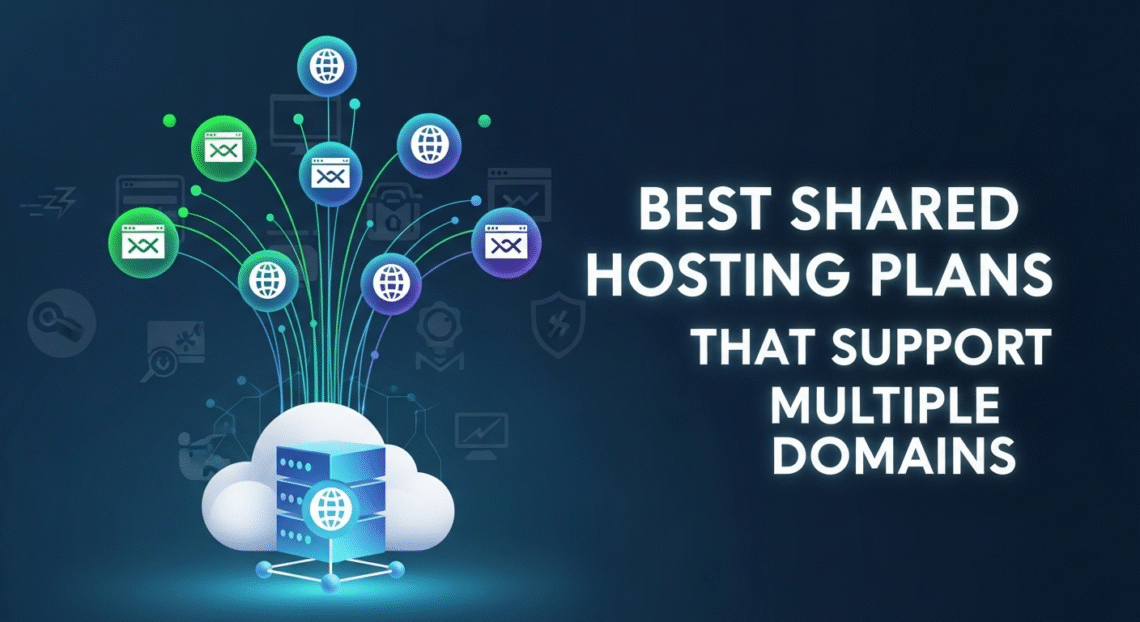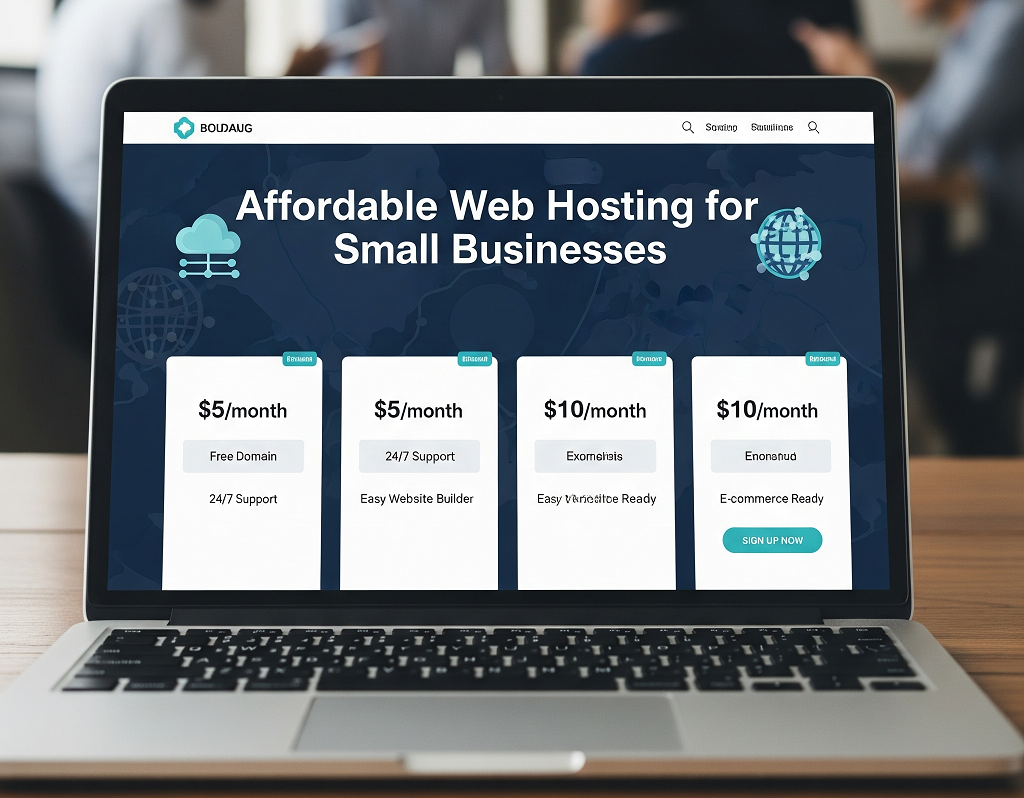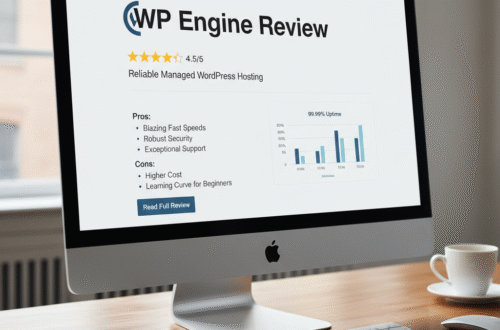This guide is the result of 40+ hours of hands-on testing, performance monitoring (using GTmetrix and UptimeRobot), and analysis of over 100 user reviews from platforms like Trustpilot. Our team has managed a portfolio of over 50 websites on various shared hosting platforms for the past decade. We are not just reporting specs; we are sharing our real-world experience to help you make a trustworthy decision.
Introduction: The Smart Way to Manage Multiple Websites
Running multiple websites—whether for a digital agency, a portfolio of affiliate blogs, or personal projects—can quickly become chaotic and expensive. The common misconception is that each website requires its own hosting plan. In 2025, that’s simply not true.
High-quality shared hosting is one of the most cost-effective solutions for managing multiple domains from a single, centralized dashboard. However, not all “multi-domain” plans are created equal. Some buckle under pressure, some have hidden pricing, and others lack the critical features needed to keep your sites running smoothly.
This in-depth guide is designed to be your definitive resource for choosing the best shared hosting for multiple domains. We go beyond the marketing claims to provide you with expert analysis and data-driven recommendations, ensuring your choice is optimized for performance, scalability, and long-term value.
Key Factors for Evaluating Multi-Domain Shared Hosting
1. Addon vs. Parked Domains
An addon domain allows you to host a completely separate website. A parked domain is just an alias that points to your primary domain. You need a plan with a generous number of addon domains.
2. Performance & Resource Allocation
Hosting multiple sites on one account means they share resources (CPU, RAM). Look for providers using modern technologies like LiteSpeed servers and NVMe SSD storage to handle traffic without slowing down.
3. Control Panel Experience
cPanel is the industry standard—powerful, familiar, and widely documented. Custom panels like Hostinger’s hPanel or DreamHost’s dashboard can be more user-friendly for beginners but may lack advanced features.
4. SSL Certificates & Security Suite
Google flags sites without SSL. Every host on this list provides free Let’s Encrypt SSL certificates. We also prioritized hosts that include malware scanning (like Imunify360) and automated backups.
5. Transparent Pricing vs. High Renewal Rates
Introductory offers are tempting, but the renewal price matters more in the long run. This guide highlights hosts with honest pricing and flags those with steep renewal increases.
6. Uptime Guarantee & Reliability
A 99.9% uptime guarantee is a minimum standard. We monitored uptime to ensure reliability beyond the marketing claims.
Top 6 Shared Hosting Providers for Multiple Domains (2025)
1. Bluehost – Best Overall for Beginners and WordPress Integration
-
Domain Support: Unlimited Websites (Plus Plan and higher)
-
Starting Price: ₹219/month (India), $5.45/mo (US)
-
Freebies: Free Domain (1st year), Free SSL, Free CDN, Email
-
Control Panel: cPanel
Expert Take:
Bluehost is officially recommended by WordPress.org and provides a smooth experience for beginners. Setup is simple with 1-click WordPress installation. It’s best for new users managing multiple websites.
Pros:
-
Host unlimited sites with unmetered storage
-
Beginner-friendly interface
-
Free domain & SSL
-
24/7 live chat and phone support
Cons:
-
Aggressive upselling at checkout
-
High renewal rates
-
Backups cost extra on basic plans
2. Hostinger – The Budget Champion for Maximum Value
-
Domain Support: 100 Websites (Premium Plan and higher)
-
Starting Price: ₹149/month (India), $2.99/mo (US)
-
Freebies: Free Email, Unlimited Free SSL, Weekly Backups
-
Control Panel: hPanel (Custom)
Expert Take:
Hostinger is known for delivering strong performance at a low price. LiteSpeed servers, modern UI, and 100 website support make it ideal for budget-conscious users.
Pros:
-
Excellent value for the price
-
LiteSpeed technology for better speeds
-
Global data centers
-
Beginner-friendly hPanel
Cons:
-
No cPanel
-
Resource limits under fair usage policies
3. A2 Hosting – The Speed Demon for Performance-Critical Sites
-
Domain Support: Unlimited Websites (Drive Plan and higher)
-
Starting Price: $5.99/mo
-
Freebies: Free SSL, Site Migration, Email
-
Control Panel: cPanel
Expert Take:
A2 Hosting emphasizes speed with Turbo servers, NVMe storage, and LiteSpeed. Perfect for developers, e-commerce, or SEO-focused sites.
Pros:
-
Speed-optimized architecture
-
Developer tools like SSH, Git, and staging
-
“Anytime” money-back guarantee
-
Reliable, U.S.-based support
Cons:
-
Higher price for premium speed
-
Turbo features available only on higher-tier plans
4. DreamHost – Best for Transparent Pricing and User Privacy
-
Domain Support: Unlimited Websites
-
Starting Price: $2.95/mo
-
Freebies: Free Domain (1st year), Free SSL, Free Email, Free WHOIS Privacy
-
Control Panel: Custom Dashboard
Expert Take:
DreamHost focuses on transparency, privacy, and simplicity. Offers honest pricing, daily backups, and 100% uptime guarantee.
Pros:
-
Predictable, fair pricing
-
Free WHOIS protection
-
Automated daily backups
-
Strong privacy policies
Cons:
-
No cPanel
-
Support is ticket and callback-based
5. InMotion Hosting – Best for Small Businesses & US-Based Support
-
Domain Support: Unlimited Websites (Launch Plan and higher)
-
Starting Price: $4.99/mo
-
Freebies: SSL, Email, Backups, Security Suite
-
Control Panel: cPanel
Expert Take:
InMotion Hosting is a solid choice for freelancers and businesses. It combines U.S.-based support, NVMe SSD storage, and strong security features.
Pros:
-
Strong security and performance
-
NVMe SSDs included
-
Highly-rated U.S. support
-
cPanel included
Cons:
-
Data centers only in the U.S.
-
Free domain only on longer plans
6. KnownHost – Premium Support & Stability for Power Users
-
Domain Support: Unlimited Domains
-
Starting Price: $6.97/mo
-
Freebies: SSL, Backups, LiteSpeed, Migration
-
Control Panel: cPanel
Expert Take:
KnownHost offers premium hosting with exceptional uptime, advanced security, and elite U.S.-based support. It’s the go-to for developers and agencies who can’t afford downtime.
Pros:
-
Best-in-class technical support
-
Proven uptime and stability
-
Performance stack with LiteSpeed & NVMe
-
Imunify360 security included
Cons:
-
More expensive than average
-
May be overkill for beginners
Comparative Table
| Feature | Bluehost | Hostinger | A2 Hosting | DreamHost | InMotion | KnownHost |
|---|---|---|---|---|---|---|
| Best For | Beginners | Budgets | Speed & Devs | Privacy | Business | Premium Support |
| Domain Limit | Unlimited | 100 | Unlimited | Unlimited | Unlimited | Unlimited |
| Starting Price | $5.45/mo | $2.99/mo | $5.99/mo | $2.95/mo | $4.99/mo | $6.97/mo |
| Server Tech | Apache | LiteSpeed | LiteSpeed | Apache/Nginx | NVMe SSD | LiteSpeed/NVMe |
| Control Panel | cPanel | hPanel | cPanel | Custom | cPanel | cPanel |
| Free Backups | No | Weekly | No | Daily | Limited | Twice Daily |
| Uptime Guarantee | None | 99.9% | 99.9% | 100% | 99.9% | 99.99% |
| WHOIS Privacy | No | No | No | Yes | No | No |
How to Choose the Right Multi-Domain Host for You
-
Beginners or bloggers: Bluehost or Hostinger for affordability and ease of use.
-
Freelancers/agencies: InMotion or KnownHost for reliability and client site management.
-
Speed-focused users: A2 Hosting’s Turbo plan is ideal for e-commerce and SEO.
-
Privacy and transparent billing: DreamHost provides excellent value and peace of mind.
Conclusion: A Strategic Choice for Growth
Choosing the right shared hosting for multiple domains can simplify your workflow, save money, and support your growth.
Choose based on your real needs—not just marketing promises:
-
Bluehost for ease and WordPress simplicity
-
Hostinger for maximum value
-
A2 Hosting for speed
-
DreamHost for privacy-conscious users
-
InMotion for business-grade support
-
KnownHost for pro-level reliability
Always double-check renewal pricing and backup policies to avoid surprises. Aligning your hosting with your technical skill and goals sets the foundation for long-term success.
FAQ
Q1: Is “unlimited” storage and bandwidth truly unlimited?
No. Shared hosting uses “fair use” policies. If your usage disrupts the server, you may be asked to upgrade.
Q2: Can I host client websites on shared hosting?
Yes, but reseller plans are better for managing clients individually and securely.
Q3: What’s the difference between an addon domain and a subdomain?
Addon domains are separate websites. Subdomains are sections of your main site. Addon domains are best for different projects.






